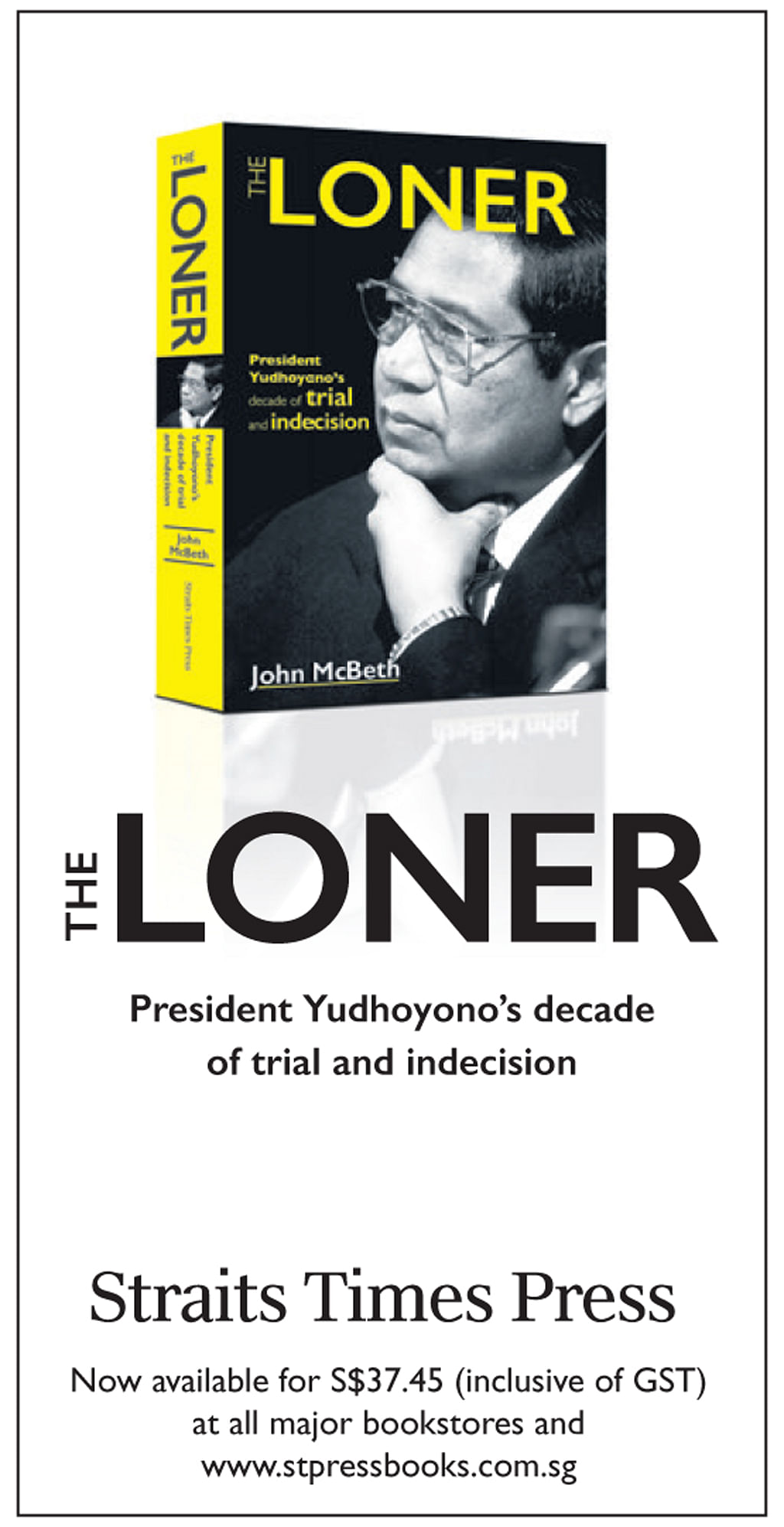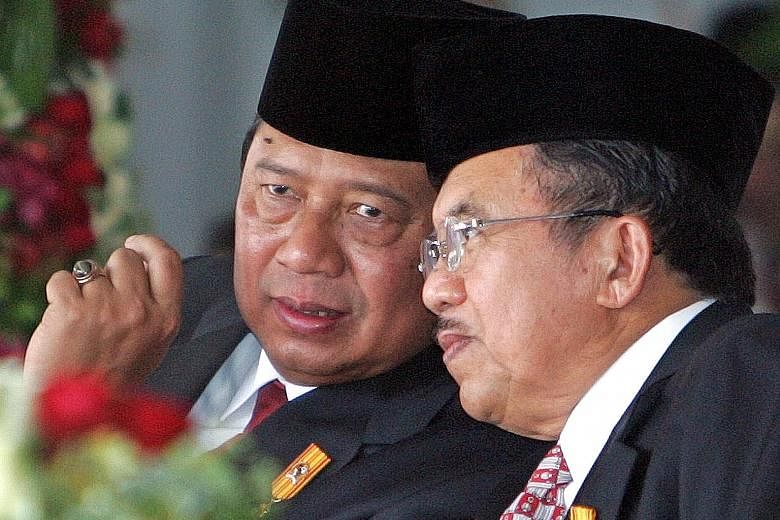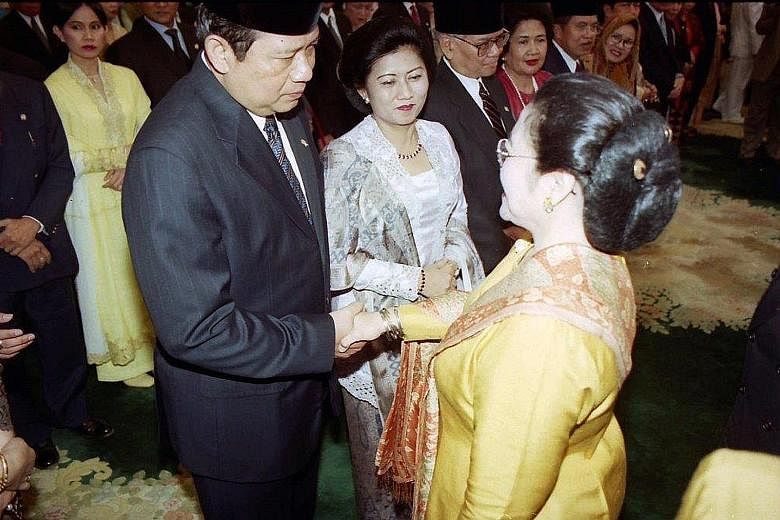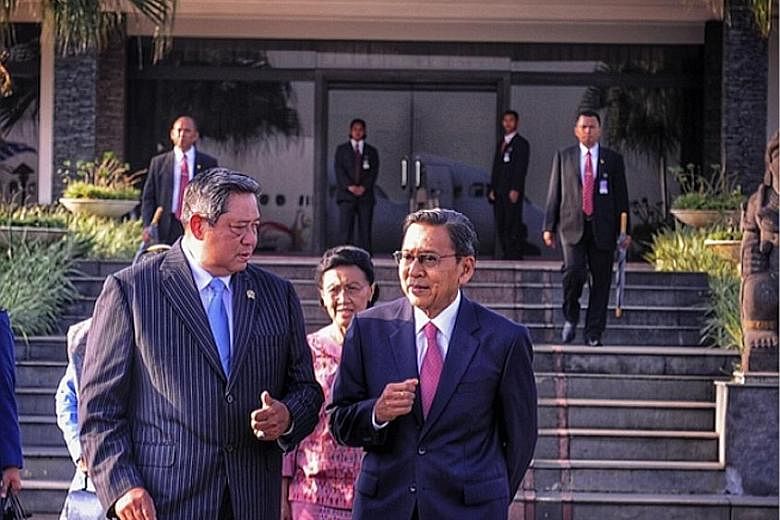As 2007 dawned, it was clear all was not well with the Yudhoyono-Kalla relationship. When the President finally got around to forming a three-man "delivery team", dubbed UPK3KR, to speed up implementation of his policies, (Vice-President Jusuf) Kalla said he felt insulted at not being consulted and senior Golkar members talked darkly of withdrawing their support for the government.
In point of fact, Kalla had been at a meeting three months before in which then Economic Coordinating Minister Boediono gave a comprehensive briefing on why the team was needed and what the President wanted it to do. People present at the session said the Vice- President was even "gung-ho" about the concept, which was meant to hasten Yudhoyono's promised reforms over the final period of his first term when he would need to demonstrate genuine progress.
The uproar may also have had something to do with Marsillam Simanjuntak, the tough-minded team leader. As state secretary to former president Abdurrahman Wahid, he had been suspected of having a hand in Wahid's ill-fated attempts to get Golkar disbanded on an electoral technicality in 2000. In any event, for all the media furore, Yudhoyono and Kalla staged a well-publicised meeting to paper over their differences. The decree would stay, it was decided, but the new unit would handle purely technical issues and leave economic coordination to the Cabinet.
The relationship between the pair had long been the subject of speculation. It was agreed from the outset that Kalla would largely be responsible for economic issues, while Yudhoyono would focus on politics, security and foreign affairs. Both inevitably strayed into each other's territory at one time or another, but there is no question the impulsive Kalla did things that irritated Yudhoyono, who even at that early stage showed himself to be more thin-skinned than he appeared. It was also clear that Kalla was often frustrated, like everyone else in the inner circle, at the President's reluctance to be more assertive.
The creation of UPK3KR - modelled on a similar unit established in then British Prime Minister Tony Blair's office, rather than the White House West Wing concept many insiders compared it to - was quickly interpreted by Golkar politicians and media commentators as an attempt by the President to undermine Kalla's oversight role. In actual fact, the idea for the unit was first raised by management consultant firm McKinsey and the Partnership for Governance Reform. The President seemed enthusiastic, but typically took months to make up his mind.
In the end, despite all the controversy it had aroused, the unit never got off the ground, with a team member, retired lieutenant-general Agus Widjojo, describing it as a "non-starter", a "limp organisation" that Yudhoyono chose not to defend. Simanjuntak was subsequently overlooked for a Cabinet post. Some believed it was because he was a Christian, but the President may have also been worried about his uncompromising attitude.

In an interview with Tempo magazine, Kalla tried to clear the air by describing his relationship with Yudhoyono as "a duet, not a duel". But the real test of their comfort level would come in early 2009 when Yudhoyono would have to decide on a running mate. As annoying as Kalla could be sometimes, most analysts would now say his "can-do" attitude made all the difference between Yudhoyono 1 and Yudhoyono 2.
For all the fallout over the oil price increase, Yudhoyono's popularity still hovered between 50 and 60 per cent. "We are moving in the right direction and they (Golkar) are losing the wind," boasted spokesman Andi Mallarangeng. "They have to do something - it's the sign of a desperate situation. But time is on our side. The longer the President is in power, the more he can do." Surveys placed the Democrat Party just behind Golkar - a reflection more of the President's enduring popularity than anything the party had done since the 2004 elections.
BAD FOR BUSINESS
Billed as a briefing for the long-delayed December 2006 Infrastructure Summit, a meeting for private sector participants at the Mines and Energy Ministry in mid-October said a lot about Indonesia's efforts to attract more foreign investment. People who attended the meeting said it began badly and ended in a farce after it was belatedly discovered that two power projects on offer failed to meet conditions set by a presidential regulation on public-private cooperation. For that reason, neither could be presented as "model projects", the status that would qualify them for a new sovereign guarantee scheme meant to underwrite the ability of power utility PLN to pay its bills.
Such glitches and a lack of careful preparation - much of it rooted in bureaucratic ineptitude - were complicating the government's efforts to compete for foreign investment, already hampered by legal uncertainty and restrictive labour laws. Not only was Yudhoyono failing to bend the 4.6-million-strong bureaucracy to his will, but also a World Bank report showed that Indonesia was still one of the most difficult places in the world to do business - and was in fact getting progressively worse.
While it had received grudging praise for reducing the time and cost needed to start a business, there was no progress on issues such as registration and licensing, tax payments, employment, trade, financing and contract enforcement. Granted, it now took only 97 days - down from 151 - to set up a business, but after that foreign investors were confronted with almost a year of bureaucratic hassles to get the necessary licences. The World Bank report found it also took two months to get through tax payment and Customs clearance procedures, as well as almost two years to settle labour issues.
Businesses often had to shoulder exorbitant administrative costs and struggle through twice as many bureaucratic procedures as their counterparts in other Asian countries. No wonder, then, that Indonesia was relegated to 135th out of 175 countries surveyed by the World Bank and its financial arm, the International Financial Corporation, in their 2007 Doing Business report. In the previous year, it had ranked 131st among 155 nations.
Foreign direct investment (FDI) in Indonesia fell 44 per cent to US$4.3 billion in the January-September period of 2006 from the same period the year before. For many businessmen, the bottom line was a lack of interest among bureaucrats in doing what the administration wanted - and an administration that was either unwilling or unable to put the squeeze on them to get the job done.
Indonesia's civil servants seemed uninterested in doing anything unless there was a reward at the end of it. But pay-offs were just one factor. Often, it ranged from a simple lack of commitment to a barely disguised hostility towards foreign investment. And there was another significant obstacle: a fear of running afoul of anti-corruption and other law enforcement agencies if there was any attempt to cut corners.
With Simanjuntak's delivery team failing to make it past first base, politicians seemed to find little reason for urgency either. Although Parliament had passed Customs legislation aimed at, among other things, streamlining cargo handling, new investment and tax laws had been languishing in the commission stages for nearly a year and there was a full-scale government retreat on employer proposals to amend onerous provisions in the 2003 Labour Law.
Moving into the early months of 2007, Yudhoyono continued to baffle everyone with his reluctance to use his sizeable electoral mandate to push a reform agenda that was fast running out of steam. One poll, for example, showed that public trust in his anti-corruption campaign had plummeted from 81 per cent to just 29 per cent.
FEAR OF FOES
Another sign of his timidity had been his decision to skip the East Asia Summit on the Philippine island of Cebu because of "urgent matters" at home. The main reason: a small Jakarta demonstration organised by a group of washed-up politicians, some with links to former military chief Wiranto and other retired generals. Yudhoyono's own ministers were privately embarrassed at the weak excuse offered by the leader of the largest Asean state, whose strength, even its relevance, lay in its external relations - particularly with China and Japan.
The presidential entourage flew from Cebu to the North Sulawesi capital of Manado and then on to neighbouring Gorontalo province, where on the day of the summit Yudhoyono and his wife were pictured attending to the important task of planting rice. The National Intelligence Agency had urged him not to fly back to the capital immediately because of fears his presence would give the demonstration greater impetus. In the end, a mere 500 protesters showed up - only half of what was expected.
What seemed to alarm the President even further were rumours that former army chief Tyasno Sudarto and other like-minded military retirees had formed a sinister-sounding Revolutionary Council, supposedly dedicated to bringing him down. How and why have never been explained, but if the goal of his opponents was to create political uncertainty, Yudhoyono played right into their hands. "They (his opponents) are trying to raise doubts about his leadership," one senior Asian diplomat told me. "It is the only card they have to play."
Yudhoyono's concerns about his peers were more psychological than anything else, based on what one government official complained was an "over-deference" to his seniors from the New Order era when the military reigned supreme. He refused their repeated requests to meet them, instead dispatching Political Coordinating Minister Widodo Adi Sutjipto, a retired admiral, to hear their complaints. Explained one retired general: "There is no way he would have a discussion with them himself, given their respective differences."
People who knew him well said they believed Yudhoyono entered politics on the false assumption his role as president would be carefully structured. But he quickly discovered that winning an election and employing his newly won power in day-to-day politics were two very different things. That left him looking like someone struggling through a swamp, carefully ensuring he was on solid ground before taking another step. "Yudhoyono is defined by his behaviour," one frustrated former colleague told me. "He wants to please everyone. That means he never wants to take positions."
IMAGE-CONSCIOUS
Even if his integrity and obvious sincerity were his main selling points, (former president) Megawati (Sukarnoputri) may have been right when she said Yudhoyono was far too absorbed in burnishing his own image. "It is the focus of everything he does," the former colleague agreed. "It is the centre of his world." That was never so clear as in May 2013 when he flew to New York to receive an award for religious tolerance from the Appeal of Conscience Foundation - something he should never have been recognised for.
Failing to win the 2006 Nobel Peace Prize for championing the Aceh accord was a great disappointment. Yudhoyono's lack of decisiveness may also have stemmed from his own perception as a minority leader who lacked the political base to take a more assertive approach. Some analysts believe he lost that initiative when he formed his Cabinet, choosing to compromise too much rather than insisting on bringing in his own people to fill key posts. While political trade-offs were necessary, Yudhoyono never used his mandate to appeal directly for public support on important policy issues.
It was the same way in the palace. Initially, the President talked to a wide range of people, but apart from first lady Kristiani, he did not have any advisers in whom he placed his complete trust. "Discourse often seems to be an end in itself," noted one palace insider. "Absorbing and implementing new things is difficult for him." During his second term, he became noticeably more aloof and began to take on the demeanour of someone who felt more comfortable on a throne.
One former official on (then Vice-President) Boediono's staff says he had assumed there would be a close working relationship with the President. Instead, the Vice-President first had to call Yudhoyono's adjutant to seek an appointment, even if the President did always find time to see his No. 2. "It was a hierarchical relationship, and being Javanese, Boediono was always aware of his place," recalls the aide. "I thought they would talk every day, but the relationship wasn't close at all."
Of course, there has always been a temptation among amateur psychologists to see Yudhoyono's tiny circle of close friends and his penchant for wanting to float above the fray as symptomatic of his upbringing. The so-called Only Child Syndrome is usually applied to single children who have problems forming relationships or functioning socially and over time intentionally distance themselves from others out of a sense of superiority.
But University of Texas expert Toni Falbo says what may be more to the point is that being quintessentially Javanese, Yudhoyono was motivated in his personal relations by the need to be non-committal, to avoid confrontation and to maintain face. Above all, was his obsession with consensus. In the privacy of the palace, Yudhoyono explained that no decision was easy because it always involved factors which had to be balanced against one another.
Strangely comforting was the frank admission by those around him that three years into his presidency they were in no better position to explain his leadership style than they were when he first took office. There was always a familiar shrug of the shoulders and the somewhat apologetic explanation that Yudhoyono was long on diagnosis, but short on the cure. Even back then, the President often appeared "overly sensitive" to the polls - something he came to rely on more and more - and was well aware of his reputation for indecisiveness.



